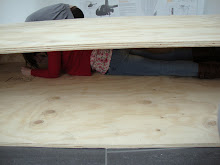By tracing patterns of mutuality across behaviour, ideology, experience and theory, I want to speak of being as an entity, tangible and defined yet loose with contradictions and allowances; loose enough for the winds of questioning to rupture or close its assumed, plural and/or circumspect understandings.
(With the valorization of subtlety into salience comes the risk of slamming doors.)
In her text, We: Collectivities, Mutualities, Participations, Irit Rogoff speaks of a potentiality of human co-existence; ‘being’ is mentioned in relation to Jean Luc Nancy’s expansion of Plato’s ‘dialogue of the soul with itself’.[1]
The basis of this interpretation of ‘being’, is accepted (by its author) as one of many. ‘Being’ as a non-narratability, words as subjective translations, my interpretation enters into the personal by similarities to, and deviations from the collective; the artist/cultural worker Chu Yuan states, there will always be degrees of internal conversations within collaborative dialogues.[2] So, understandings move back and forth, laterally, diagonally, in every which way but not, I hope, in closed circularity. A methodology for speaking of ‘being’ to launch ‘an infinite action of interpretation’[3].
Forming from this, intertextual discourse analysis uses Rogoff’s work as a base for bringing in Nancy’s theories and extending into Hannah Arendt, J.K. Gibson-Graham, Mick Wilson and Nancy Stark Smith. Reference is made to metaphysical and Eastern philosophies in the writing of Martin Buber and traditions of Zen Buddhism. Brief possibilities around the tangible manifestations of such ‘being’ states, in terms of subjective experience and wider socio-cultural activity, are touched upon. Begin to generate a thought and a vision, and an actualisation.
(To define ‘being’ may be paradoxical but the irony is not lost – it works to check for frontal categorizations against those of useful thinking[4]).
Can we speak of the possibility of ‘being’ as a third space? A space in parallel to, that does not overlap, intersect or conflict with, other plural spaces. As such, ‘being’ would exist as an entity outside of accepted modes of duality. It would be independent, self-sustaining, self-functioning.
(Note, I am not positing an Is[5] here as an all encompassing Total politics, rather the possibility of a Truth as a non-enforced/able parallelity).
In Being Singular Plural, Nancy pluralises Plato’s theory, seeing it as a dialogue of souls with itself as an infinitely collective body.[6] What is perceived as otherness is at once within, a commonality and connection among people. Theorising publics, various thinkers seem to argue for a loss of definitives, for example Simon Sheikh describes pluralities that overlap, conflict; bodies of people and meanings that continually intersect and dislocate.[7] Again, from another viewpoint, Chantal Mouffe speaks of ‘agonism’ where collective ‘being’ is contingent on shared co-existences (whether consensual or otherwise).[8]
However, such theories retain politizations of collectivities of ‘being’, whereas the state of ‘being’ or beingness seems to operate somewhat differently, particularly when seen through Eastern philosophy and practice. These perhaps echo Rogoff (and my own interpretation) more closely. ‘Being’ is described as an experience of connection to something or someone outside of the individual, transcending the conventional contextualisations of ‘me’, ‘community’, ‘public’. Described as a meditative experience beyond intellectual rationale [9], the separatist categorizations produced by the thinking mind dissolve in a process of presentness.[10] Rogoff argues for mutualities that function outside of limiting ‘frontal relations’[11], quoting Nancy’s understanding of ‘we’ where ‘meaning is itself the sharing of being’[12].
There are ideas of Truth related to knowledges that exist in and of themselves, without the mind’s inception, judgement, analysis; they are meaning, rather than having meaning (meaning as derivative). As Nancy states, ‘Being itself is given to us as meaning…’[13] A state of mutual connectedness beyond individualised identities, egos, could then be said to access the essence of what it is to experience humanity. Humanist ideologies’ belief that life is a ‘value’ in and of itself[14], bears possibilities that a ‘being’ experience of life has power.[15] If applied to the political, could this power, which Rogoff describes as involving participations that exist ‘at a barely conscious level’[16], present radical effectivity? If so, ‘being’ as an entirely independent state would suggest that inter-relational seeds between other states or systems, are not essential for radicality. In ‘being’, individuals, collectivities or otherwise, exist as an unviolating (nonreactive), unviolatable (as distinct) entity. Can such a parallel act as an automatic realisation of alteriority upon its neighbouring interiorities? Can it affect, change, without enforcement, systematisation, formal communication, simply due to its nature as existing?
In proposing contemporary evolutions of socio-cultural politics, modes such as thinking as performative action, ‘operative writing’[17], ideologies of the author as producer[18], for example, become replaced by participations of ‘being’. What could happen? Stasis? Cohesion? Collapse?
Stop-gap.
Plural singularities existing with awareness; Martin Buber writes on the possibility of meaning existing within ‘the crowd’, when he states ‘It cannot be one who is reserved, only one who is given; given, not given over. It is a paradoxical work…to make the crowd no longer a crowd. It is to bring out from the crowd…’[19]
It could be argued that processes of ‘being’ must in some way, at some point touch upon other spaces; if movements were to retain an infinite independent space, how can I speak now? Moving from ‘being’ states, collectivities seem to continue to have the potential for power, power to inter-relate and create meanings out of experience, through confluence/transpositions into other spaces. Hannah Arendt argues that only through continual inquiry into actualisations and meaning (which move from this third space) does life fulfil itself, ‘the revelatory character of action as well as the ability to produce stories and become historical, which together form the very source from which meaningfulness springs into and illuminates human existence.’[20] For Arendt, in conjunction with praxis, language and narrative are fundamental[21] to what she perceives as the need to transpose the existential into a political context.[22]
As a form of rationality, such communicability seems to lie outside states of ‘being’. Mick Wilson speaks of undefined knowledges as legitimate, asking, ‘does every knowledge need to be classified and operationalised? ... Perhaps there is a danger of flattening out certain particularities, reducing knowledge systems… through linear formalisation.’[23] However, if validity is extended to a knowledge that synthesises the analytical with the experiential, and retains as Arendt argues, its intrinsic revelatory value, there may be the potential for other, ever-in-flux states of knowing to exist. How might these feel?
The feminist theorists, J.K. Gibson-Graham in strategising ‘a politics of (economic) possibility’, base their ideas on ‘notions of unthinking…anti-essentialism… anti-universalism, and anti-structure, all in order to conceptualize ‘“contingent relationships” that replace “invariant logics.”’[24] Their theory (which is founded extensively within action research) offers a knowledge that is social, politically manifest and complex. Knowledge that is ‘chaotic’ and/or coming from notions of failure, appear relevant in the allowances, the becoming of such processes. Rogoff emphasises meaning that ‘‘Takes Place’ in the present’ in a movement away from predetermined outcomes, ‘the possibility of ‘a politics without a plan’.’[25] In contemporary systems of behaviour (roles), this improvisation is risk. Nancy Stark Smith, describes what she terms the ‘gap’ as a moment ‘where you experience a temporary absence of reference, a feeling of being between forms and not sure what’s happening or what to do.’[26] Automatic conditioning fills-up, fills-in with familiarities. Stark Smith offers, ‘hang out in the gap and see what happens.’[27] Politically, Gibson-Graham describe this open precariousness as ‘Weak Theory’, stating it makes ‘strong politics’ by allowing access to broader social options, wider affective possibilities and a maximised positive affect.[28]
This is a modest politics; it does not come forced, follows rather than leads.[29] As with Arendt’s ‘space of appearance’, linking into Nancy’s ‘being with’, it operates as a fragility within the social. It could be understood that in order for appearance, degrees of trust are at play. An impulse and an ability to side-step conventions would seem a prerequisite.
A side-step, in reality, is more of a climb. Walls of security around mindsets cultivating circular understandings can close-off possibilities and negate threads that may (or may not) run in, out of, and through systems and experience. These resistences work on continual activation, re-activation ensuring equilibriums of stasis are maintained however much a simultaneous desire for change, progress, revolution is argued for.[30] There is comfort in familiarity. When something exists out-of-joint from these walls, perceptions threaten to destabilise structured norms and lawful values, and resistences arise, revolve around reactions against, actions alternative to.[31]
In an effort to nudge this tendency into a wider political contextualisation, contrasts and comparisons can be discussed. However, in the end, I edited these out. I decided to procede with caution.[32]
And so…
How can we speak of a politics that is not Socialism, not Communism, not anarchism, not Capitalism, post-Capitalism or anti-Capitalism, not Christian or Post-Christian democracies, not political irrationality, not Buddhism, not Existentialism, not Syndicalism, nor philosphical idealism? How can we speak of human resonances in the political, without falling into further divisions, precisions for the sake of oppositionality and power as exclusive? John Dewey reflects, ‘Civilization is uncivil because human beings are divided into non-communicating sects, races, nations, classes and cliques.’[33] Perhaps, we can look to the Placa dels Angels, Barcelona, where skateboarders and (non-skateboarding) citizens operate public space with interdependent precarity, more so than in tolerance or an imposed idealistic harmony.[34] Or, to the Dutch-Belgian border, where the towns Baarle-Nassau and Baarle-Hertog interweave, overlap and merge, a complex of frontiers, each working simultaneously as independent, inter-dependent and co-dependent.[35] Perhaps these are concretisations of resonances, dissonances?
Although Gibson-Graham’s work seems to echo transpositions of ‘being’, it still maintains the initial seed of adaptation prior to evolving ‘new’ processes.[36] Strategies which modify dominant (read Capitalist) systems can all too often present what are essentially marginal deviations.[37] If as thinkers such as Slavok Zizek state, Capitalism is somehow contemporary society’s shape-shifter, morphing through appropriation, adaptation, and dispossession[38], what of the sustainability or even the integrity of quiet augmentations? Actions that are interconnected and continually subsumed by a system, regardless if they are against or for it, can still be seen to activate at a formational level, the system itself.[39]
If ‘being’ as an experience has no interlinking or relationality with ‘other’ plural spaces, it is suggestive of a politics that holds no risk of subsumation. Even if in its transposition, translations are recategorized, at its very essentiallity it is unviolable. Doors cannot close, if no doors exist. Then how to access, how to know? Perhaps manifestations need not in their difference, appear or act differently. If marginal, barely perceptable shifts exist beyond the frontal, operate on a core significance, and are lived through a sustained commonality and circulation, could to ‘be’ or to ‘be with’ come without ‘access’, ‘risk’, ‘resistence’ or dubious ‘alliance’? Can a door no longer be a ‘door’ on a windy day?
For me, to experiment in actualising these and/or my own abstractions, to merge thinking with ‘being’ performatively, processes can swing low; with complexity, connections, repetitions, fractures, contradictions, bias, flow, self-consciousness. Writing and reading through, the strength of conformity reveals itself as oscillations struggling between un-, re-, non-categorisations and something else. I re-write. I re-read. I am not sure how to think and speak with laterality from a parallel state of ‘being’ and still retain precision in communicability. Maybe Beckett got it. But this is fine. This is process. Perhaps, poor process. Perhaps failure. But this is fine. (For now, this is my risk.)
Soft Quiet. Thinking Precisely, Moving Quietly. Precise Moves. Quiet Thoughts. Moving softly, thinking precisely. Pause/s. Precise Pausing… Soft Space. Soft Spaces.[40]
© All rights reserved, RACHAEL GILBOURNE, 2010
Bibliography:
Benjamin, Walter, “The Author as Producer”. 18 March 2007. 19 October 2010.
roundtable.kein.org/.../Walter%20Benjamin_%20The%20Author%20as%20Producer.pdf - >.
Bishop, Claire, “Antagonism and Relational Aesthetics”, October 110, (Fall 2004):
51-79.
Buber, Martin, Between Man and Man, (London: Collins Clear-Type Press, 1947).
Conlan, James Allan, Listening to the Unknown, (Co. Clare, Ireland: Ryehill
Publications, 1999).
Dewey, John, Art as Experience, (London: Penguin, 1937).
Gill, Susan, “DIY Music Practitioner As Interface: A Study Of Networks, Community
And Biopower In Immaterial Labour”, Forecasting the Future: Visual Arts
Practice in the 21st Century, School of Creative Arts Research Seminar 2010 in association with Visual Arts Practices, Dun Laoghaire Institute of Technology, Art and Design, Dublin, 5 October 2010.
Holert, Tom, “Hidden Labor and the Delight of Otherness: Design and Post-Capitalist
Politics”, e-flux Journal 17 (June-August 2010): 1-9.
Koren, Leonard, Wabi-Sabi for Artists, Designers, Poets and Philosophers,
(California: Stone Bridge Press, 1994).
Koteen, David and Smith, Nancy Stark, Caught Falling: The confluence of Contact
Improvisation, Nancy Stark Smith, and other moving ideas, (Northampton,
MA: Contact Editions, 2008).
Kristeva, Julia, Hannah Arendt: Life is a Narrative, (Toronto: University of Toronto
Press Inc., 2001).
Kutor, Anna J., “Bordering on Bizarre”, Ryanair Magazine 43, (16 September – 15
October 2010): 84 - 86.
Mouffe, Chantal, “Which Public Space for Critical Artistic Practices?”, Cork Caucus:
On Art, Possibility & Democracy, ed. Tara Byrne (Cork, Ireland: National Sculpture Factory & Revolver Press, 2006) 149-171.
Nancy, Jean Luc, Being Singular Plural, (California: Stanford University Press,
2000).
Rhodes, Duncan, “Street Riders”, Ryanair Magazine 43, (16 September – 15 October
2010): 60 – 66.
Rogoff, Irit, “We: Collectivities, Mutualities, Participations”. 08 June 2004. 18
http://theater.kein.org/node/95>.
Sheikh, Simon, “In the Place of the Public Sphere”. 2001 and Spring 2002. 14
Tate Modern, “Rodenko and Popova: Defining Constructionism”. May 2009. 9
September 2010.
Van Heeswijk, Jeanne, “The Faculty of Being Public”, Keynote Address, Blue Drum
'Artizen' School in association with Graduate School of Creative Arts and Media, The National College of Art and Design, Dublin, 15 October 2010.
Von Osten, Marion, “Editorial – In Search of the Postcapitalist Self”, e-flux Journal
17, (June-August 2010): 1-6.
Williams, Raymond, Keywords: A Vocabulary of Culture and Society, (London:
Fontana Press, 1976).
Wilson, Mick, “Approaches to Collaborative Arts Practice: Chu Yuan in conversation
with Mick Wilson”, Graduate School of Creative Arts and Media, Wood Quay
Venue, Dublin, 30 September 2010.
Yuan, Chu, “Approaches to Collaborative Arts Practice: Chu Yuan in conversation
with Mick Wilson”, Graduate School of Creative Arts and Media, Wood Quay Venue, Dublin, 30 September 2010.
[1] Irit Rogoff, “We: Collectivities, Mutualities, Participations”. 08 June 2004. 18 October 2010. http://theater.kein.org/node/95. 1.
[2] Chu Yuan, “Approaches to Collaborative Arts Practice: Chu Yuan in conversation with Mick Wilson”, Graduate School of Creative Arts and Media, Wood Quay Venue, Dublin, 30 September 2010.
[3] Julia Kristeva, Hannah Arendt: Life is a Narrative, (Toronto: University of Toronto Press Inc., 2001) 18.
[4] ‘Useful thinking’ is a reference to thinkers such as Arendt, Rogoff and Walter Benjamin where instead of reiterating or reinforcing dominant thought, thinking is used as a process of excavating understandings beyond accepted, superficial or limited meanings.
[5] The term ‘Is’ comes from the tenets of Buddhist philosophy on ‘being’ as presentness, as the essence of existence, with meaning in and of itself.
[6] Jean Luc Nancy, Being Singular Plural, (California: Stanford University Press, 2000) xvi.
[7] Simon Sheikh, “In the Place of the Public Sphere”. 2001 and Spring 2002. 14 September 2010. http://www.societyofcontrol.com/research/sheikh.htm. 1.
[8] Chantal Mouffe, “Which Public Space for Critical Artistic Practices?”, Cork Caucus: On Art, Possibility & Democracy, ed. Tara Byrne (Cork, Ireland: National Sculpture Factory & Revolver Press, 2006) 157.
[9] Leonard Koren, Wabi-Sabi for Artists, Designers, Poets and Philosophers, (California: Stone Bridge Press, 1994) 76.
[10] James Allan Conlan, Listening to the Unknown, (Co. Clare, Ireland: Ryehill Publications, 1999) 178 - 180.
[11] Rogoff 3.
[12] Nancy 2.
[13] Nancy 2.
[14] Kristeva 9.
[15] ‘Power’ is used here with the meaning that Rogoff ascribes it in “We: Collectivities, Mutualities, Participations”.
[16] Rogoff 1.
[17] For the Russian Constructivists of the 1930s, the term ‘operative writing’ described the act of using the functioning of the system to work against the system, by, as Vladimir Mayakovsky states, employing ‘all the weapons used by our enemies' (Tate Modern, “Rodenko and Popova: Defining Constructionism”. May 2009. 9 September 2010. http://www.tate.org.uk/modern/exhibitions/rodchenkopopova/roomguide/room9.shtm. 1.).
[18] See Walter Benjamin’s seminal text, “The Author as Producer” (1937).
[19] Martin Buber, Between Man and Man, (London: Collins Clear-Type Press, 1947) 88.
[20] Hannah Arendt in Kristeva 9.
[21] Kristeva 18.
[22] Kristeva 13.
[23] Mick Wilson, “Approaches to Collaborative Arts Practice: Chu Yuan in conversation with Mick Wilson”, Graduate School of Creative Arts and Media, Wood Quay Venue, Dublin, 30 September 2010.
[24] Tom Holert, “Hidden Labor and the Delight of Otherness: Design and Post-Capitalist Politics”, e-flux Journal 17 (June-August 2010): 6.
[25] Rogoff 1.
[26] David Koteen and Nancy Stark Smith, Caught Falling: The confluence of Contact Improvisation, Nancy Stark Smith, and other moving ideas, (Northampton, MA: Contact Editions, 2008) 96.
[27] Koteen and Stark Smith 96.
[28] J.K. Gibson-Graham in Holert 6.
[29] Holert 5.
[31] In the micro-system of the reading group (MAVis 2010), in my eyes, there was a reiterated, frustrated need to classify what it is Rogoff writes of in We: Collectivities, Mutualities, Participations , which over-rode possibilities for a more open standpoint, acceptance of other forms of knowledge, of ‘being’, perhaps not-so-easily-identifiable.
[32] To think in hierarchies, set-up oppositions, would be to opt for the tools of linearity that may lead to over-simplification and a negation of ‘being’ as innately non-relational to systems of duality. Thus, to discuss ‘being’ on its own terms, as a non-reactive knowledge process, the established contexts - from which to be, move and poke open doors in search of ‘new’ co-existences - are used in the minor, and with the intention of welcoming the closing of doors and/or perhaps nudging them further open again.
[33] John Dewey, Art as Experience, (London: Penguin, 1937) 336.
[34] Duncan Rhodes, “Street Riders”, Ryanair Magazine 43, (16 September – 15 October 2010): 60 – 66.
[35] Anna J. Kutor, “Bordering on Bizarre”, Ryanair Magazine 43, (16 September – 15 October 2010): 84 - 86.
[36] Marion von Osten, “Editorial – In Search of the Postcapitalist Self”, e-flux Journal 17, (June-August 2010): 3.
[37] Raymond Williams, Keywords: A Vocabulary of Culture and Society, (London: Fontana Press, 1976) 52.
[38] Susan Gill, “DIY Music Practitioner As Interface: A Study Of Networks, Community And Biopower In Immaterial Labour”, Forecasting the Future: Visual Arts Practice in the 21st Century, School of Creative Arts Research Seminar 2010 in association with BA Visual Arts Practices, Dun Laoghaire Institute of Technology, Art and Design, Dublin, 5 October 2010.
[39] Jeanne van Heeswijk, “The Faculty of Being Public”, Keynote Address, Blue Drum 'Artizen' School in association with Graduate School of Creative Arts and Media, The National College of Art and Design, Dublin, 15 October 2010.
[40] Nausea overcame heavy concept, theory, linearity paraded as insight, paths out of such. ‘Adoration of the mind, adoration of the mind…’ swimming in a mad convulsion. Bringing out from the crowd, I took a taxi home. These words rose light, clear, dare I say, lovely.
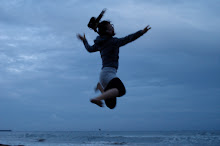

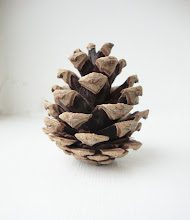



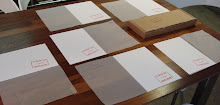

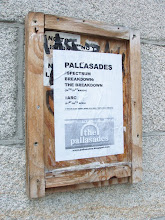.jpg)

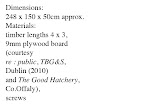.jpg)
